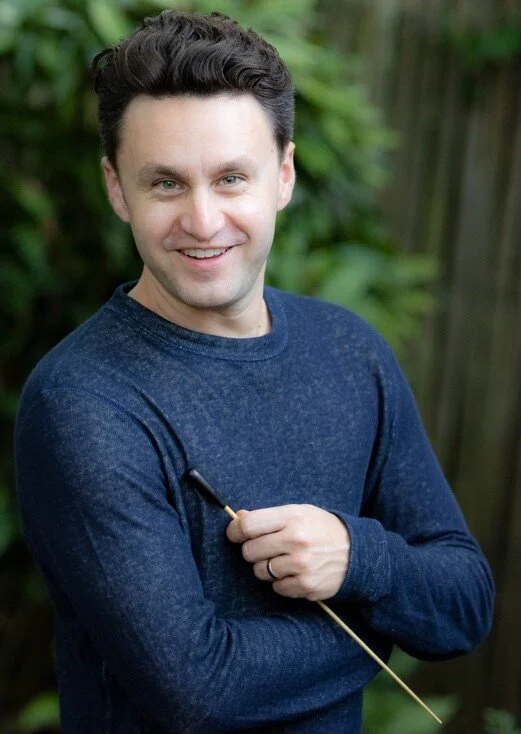Photo credit: Stan Engebretson
American conductor Matthew Robertson (b. 1986) is the founder and driving voice of the professional choir and orchestra The Thirteen, which he has led in more than two hundred concerts, two dozen concert tours, nine commercial recordings, and numerous world premieres. Noted for boundary-defying performances that “transfigure the listener” (The Washington Post), for his “incisive tempos and dramatic pacing” (Washington Classical Review) and “flowing lines and dramatic climaxes”(Fanfare Magazine, UK), Robertson’s vision has led to acclaimed performances of a diverse repertoire, often featuring use of staging and multimedia, and to The Thirteen’s winning the Most Creative Programming Award from the Greater Washington Area Choral Music Awards.
Robertson advances the frontier of vocal music performance, reimagining music from the entirety of the classical music canon. Equally at home in well-loved classics and contemporary works, Robertson tackles music by Renaissance and Baroque masters and contemporary composers with equal skill. For example, Robertson’s “highly convincing” (Organists’ Review) curation of Monteverdi’s end-of-life magnum opuses resulted in concerts in The Lost Vespers series and the commercial recording Monteverdi: The ‘Lost’ Vespers of 1650, while a recent performance of contemporary compositions was hailed as “Sensational stuff” by Michael Andor Brodeur, chief music critic of The Washington Post. Robertson’s passion for reinterpreting masterpieces has led to staged performances of J.S. Bach’s St. John Passion and Johannes Brahms’ Requiem, and the use of projected images in Kile Smith’s The Consolation of Apollo, the World Premiere of Scott Ordway’s The Outer Edge of Youth, and the Washington, D.C. premiere of Joby Talbot’s Path of Miracles.
Robertson’s programming frequently addresses the issues of our time. His concerts Sing Willow (2020), From Tree to Shining Tree (2019), Ordway’s The Outer Edge of Youth (2022), and Light of a Clear Blue Morning (2025) grapple with climate change. His staged 2021 performance of J.S. Bach’s St. John Passion tackled systemic racism and was called “an indictment of injustice” (The Washington Post). The New American Songbook (2025) explored immigration and belonging. He frequently commissions underrepresented voices, including composers Juhi Bansal, Melissa Dunphy, Lori Laitman, Hilary Purrington, Diedre Robinson, Trevor Weston, and Jonathan Woody.
Committed to fostering the next generation of musicians and music lovers, Robertson has led educational residencies at more than twenty colleges and universities, including Yale University and The University of Maryland – College Park, where he led a staged performance of Johannes Brahms’ Requiem. He has also directed educational outreach for young people throughout the Washington, D.C. region, including with the Children’s Chorus of Washington, D.C. Youth Orchestra, and the LGBTQ+ teen choir, GenOUT. In 2019 he created The Thirteen’s Vocal Fellows Program, an initiative for early career singers who have experienced obstacles in the pursuit of their craft which launched in 2021.
Robertson’s growing discography with The Thirteen features nine commercially released albums, including the recently released Monteverdi: The ‘Lost’ Vespers of 1650 and The Outer Edge of Youth, of which Gramophonewrote, “Robertson’s pacing is faultless, and he shows how silences and breaths are as important in this music as the notes themselves." The recording Truth & Fable received four stars from Choir & Organ and Fanfarewhen it was released in September 2019.
Robertson served as Director of Music at Bradley Hills Church in Bethesda, MD from 2013-2025. In this capacity he conducted much of J.S. Bach’s oeuvre, the requiems of Brahms, Duruflé, Fauré, and Mozart, Arvo Pärt’s Passio, Buxtehude’s Jesu membra nostri, Carissimi’s Jephte, and many other masterworks. Robertson is a Trustee of the Denyce Graves Foundation and has also served on the Board of the DC area chapter of the American Choral Director’s Association and on the faculty of Oberlin’s Baroque Performance Institute. Robertson holds a M.M. in conducting from Westminster Choir College in Princeton, NJ, where he studied with Andrew Megill and Joe Miller, and was the Robert P. Fountain scholar at Oberlin Conservatory where he studied with Bridget Reischl, Robert Spano, and Hugh Floyd. A native Washingtonian, Robertson’s early musical formation included studies with Norman Scribner, J. Reilly Lewis, and Stan Engebretson.


